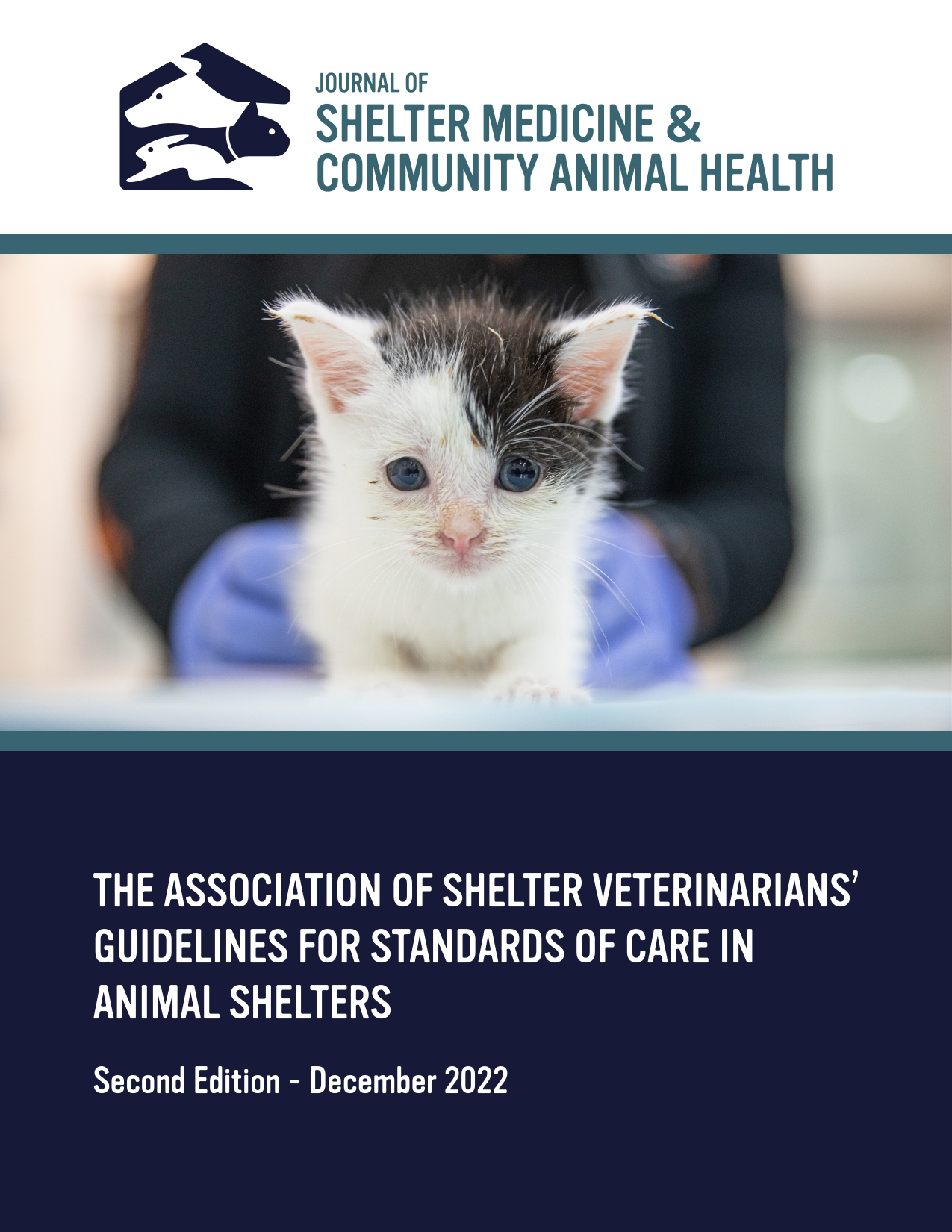The Inclusion of Cat Dens in a Population of Shelter Cats and Their Effect on Upper Respiratory Infection and Length of Stay
DOI:
https://doi.org/10.56771/jsmcah.v4.142Keywords:
shelter, feral den, housing, stress, hiding, enrichment, euthanasia, infectious disease, contagion, live outcomeAbstract
Introduction: Feline upper respiratory infection (URI) is common in high-density populations, such as those in animal shelters. URI treatment delays time to adoption, often resulting in welfare concerns and significant expenditure of shelter labor, medication, and foster care resources. The purpose of this pragmatic, randomized controlled trial was to determine if the presence of enrichment via a consistent hiding den (i.e. feral den) throughout a cat’s time in shelter reduces their URI incidence and time to adoption.
Methods: Cats enrolled in this study were assigned either a den or no den and tracked from shelter intake to outcome (i.e. adoption, return to owner, and euthanasia). Cats in both groups received the usual standard of care and were monitored daily by shelter staff. The impact of a cat den on both URI occurrence and length of stay (LOS) was modeled using logistic regression and competing risks regression models, respectively. A mediation analysis was also performed to assess the den’s effect on LOS through URI occurrence.
Results: The impact of a cat den on LOS was mediated through a decreased probability of URI. Participant cats assigned to the den group had a 33.7% lower incidence of URI diagnosis compared to those in the control group. For cats who developed URI, the presence of a den did not significantly affect the severity of disease when compared to the control group. Cats diagnosed with URI while in shelter were 27.2% less likely to be adopted at any given time when compared to cats with no URI, regardless of den presence.
Conclusion: Cats who did not experience URI while in shelter were adopted at higher rates, thus experienced shorter LOS. Since the presence of a hiding den was significantly associated with lower URI incidence, their inclusion in kennel enclosures may have positive welfare, LOS, and adoption implications for shelter cats.
Downloads
References
1.
Shelter Animals Count. 2024 Annual Analysis: Comparing 2024 to 2023 and 2019. 2024. Accessed February 3, 2025. https://www.shelteranimalscount.org/wp-content/uploads/YearEndReport_3.13_Website_FINAL.pdf
2.
Shelter Animals Count. 2023 Annual Analysis: Comparing 2023 to 2022, 2021, and 2019. 2023. Accessed January 30, 2025. https://www.shelteranimalscount.org/wp-content/uploads/2024/01/Full-Year-2023-Report.pdf
3.
Mellor DJ, Beausoleil NJ, Littlewood KE, et al. The 2020 Five Domains Model: Including Human-Animal Interactions in Assessments of Animal Welfare. Animals. 2020;10(10): 1870. doi: 10.3390/ani10101870
4.
Burns CC, Redding LE, Watson B. The Effects of Frequency and Duration of Handling on the Development of Feline Upper Respiratory Infections in a Shelter Setting. Animals. 2020;10(1828):1–10. doi: 10.3390/ani10101828
5.
Carlstead K, Brown JL, Strawn W. Behavioral and Physiological Correlates of Stress in Laboratory Cats. Appl Anim Behav Sci. 1993;38:143–158. doi: 10.1016/0168-1591(93)90062-t
6.
Vojtkovska V, Voslarova E, Vecerek V. Methods of Assessment of the Welfare of Shelter Cats: A Review. Animals. 2020;10(9): 1527. doi: 10.3390/ani10091527
7.
Tanaka A, Wagner DC, Kass PH, Hurley KF. Associations among Weight Loss, Stress, and Upper Respiratory Tract Infection in Shelter Cats. J Am Vet Med Assoc. 2012;240(5):570–576. doi: 10.2460/javma.240.5.570
8.
UC Davis Koret Shelter Medicine Program. Length of Stay (LOS). 2024. Accessed January 30, 2025. https://www.sheltermedicine.com/library/resources/length-of-stay-los
9.
Ellis S. Environmental Enrichment: Practical Strategies for Improving Feline Welfare. J Feline Med Surg. 2009;11:901–912. doi: 10.1016/j.jfms.2009.09.011
10.
Kry K, Casey R. The Effect of Hiding Enrichment on Stress Levels and Behaviour of Domestic Cats (Felis Sylvestris Catus) in a Shelter Setting and the Implications for Adoption Potential. Anim Welf. 2007;16:375–383. doi: 10.1017/s0962728600027196
11.
Vinke CM, Godijn LM, van der Leij WJR. Will a Hiding Box Provide Stress Reduction for Shelter Cats? Appl Anim Behav Sci. 2014;160:86–93. doi: 10.1016/j.applanim.2014.09.002
12.
Gourkow N, LaVoy A, Dean GA, Phillips CJC. Associations of Behaviour with Secretory Immunoglobulin A and Cortisol in Domestic Cats during their First Week in an Animal Shelter. Appl Anim Behav Sci. 2014;150:55–64. doi: 10.1016/j.applanim.2013.11.006
13.
McCobb EC, Patronek GJ, Marder A, Dinnage JD, Stone MS. Assessment of Stress Levels among Cats in Four Animal Shelters. J Am Vet Med Assoc. 2005;226(4):548–555. doi: 10.2460/javma.2005.226.548
14.
Ellis JJ, Stryhn H, Cockram MS. Effects of the Provision of a Hiding Box or Shelf on the Behaviour and Faecal Glucocorticoid Metabolites of Bold and Shy Cats Housed in Single Cages. Appl Anim Behav Sci. 2021;236:105221. doi: 10.1016/j.applanim.2021.105221
15.
Ellis JJ, Stryhn H, Spears J, Cockram MS. Environmental Enrichment Choices of Shelter Cats. Behav Processes. 2017;141:291–296. doi: 10.1016/j.beproc.2017.03.023
16.
van der Leij WJR, Selman LDAM, Vernooij JCM, Vinke CM. The Effect of a Hiding Box on Stress Levels and Body Weight in Dutch Shelter Cats; a Randomized Controlled Trial. PLoS One. 2019;14(10):1–14. doi: 10.1371/journal.pone.0223492
17.
Moore AM, Bain MJ. Evaluation of the Addition of In-Cage Hiding Structures and Toys and Timing of Administration of Behavioral Assessments with Newly Relinquished Shelter Cats. J Vet Behav. 2013;8:450–457. doi: 10.1016/j.jveb.2011.10.003
18.
Wagner D, Hurley K, Stavisky J. Shelter Housing for Cats 1: Principles of Design for Health, Welfare, Rehoming. J Feline Med Surg. 2018;20:635–642. doi: 10.1177/1098612x18781388
19.
Spindel ME, Slater MR, Boothe D. A Survey of North American Shelter Practices Relating to Feline Upper Respiratory Management. J Feline Med Surg. 2013;15(4):323–327. doi: 10.1177/1098612x13477801
20.
Dinnage JD, Scarlett JM, Richards JR. Descriptive Epidemiology of Feline Upper Respiratory Tract Disease in an Animal Shelter. J Feline Med Surg. 2009;11:816–825. doi: 10.1016/j.jfms.2009.03.001
21.
Wagner DC, Kass PH, Hurley KF. Cage Size, Movement in and Out of Housing during Daily Care, and Other Environmental and Population Health Risk Factors for Feline Upper Respiratory Disease in Nine North American Animal Shelters. PLoS One. 2018;13(1):1–15. doi: 10.1371/journal.pone.0190140
22.
McManus CM, Levy JK, Andersen LA, et al. Prevalence of Upper Respiratory Pathogens in Four Management Models for Unowned Cats in the Southeast United States. Vet J. 2014;201:196–201. doi: 10.1016/j.tvjl.2014.05.015
23.
Zwarenstein M, Treweek S, Gagnier JJ, et al. Improving the Reporting of Pragmatic Trials: An Extension of the CONSORT Statement. BMJ. 2008;337:a2390. doi: 10.1136/bmj.a2390
24.
Fine JP, Gray RJ. A Proportional Hazards Model for the Subdistribution of a Competing Risk. J Am Stat Assoc. 1999;94(446):496–509. doi: 10.1080/01621459.1999.10474144
25.
Kessler MR, Turner DC. Effects of Density and Cage Size on Stress in Domestic Cats (Felis Silvestris Catus) Housed in Animal Shelters and Boarding Catteries. Anim Welf. 1999;8:259–267. doi: 10.1017/s0962728600021746
26.
Wagner D, Hurley K, Stavisky J. Shelter Housing for Cats 2: Practical Aspects of Design and Construction, and Adaptation of Existing Accommodation. J Feline Med Surg. 2018;20:643–652. doi: 10.1177/1098612x18781390
27.
Vitale Shreve KR, Udell MAR. Stress, Security, and Scent: The Influence of Chemical Signals on the Social Lives of Domestic Cats and Implications for Applied Settings. Appl Anim Behav Sci. 2017;187:69–76. doi: 10.1016/j.applanim.2016.11.011

Additional Files
Published
Issue
Section
License
Copyright (c) 2025 Erin Hickey, Molly A. Jenkins, Katie Parker, Rimme Singh, Apryl Steele, Daniel D. Taylor, Francisco Zagmutt, Brenna Swafford

This work is licensed under a Creative Commons Attribution 4.0 International License.









